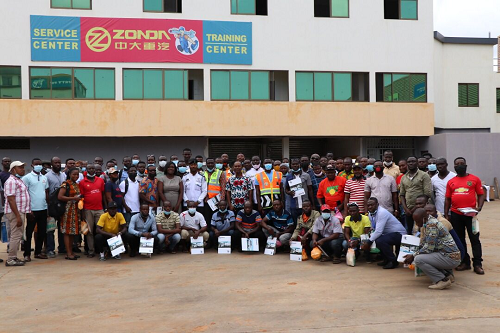As part of efforts to improve the skills and attitudes needed for vehicle safety, heavy and light duty drivers of Zonda Tec Ghana Limited, have undergone a day’s training at the premises of the company.
The over fifty drivers were taken through personal responsibility, causes of accidents, defensive driving techniques, rules and regulations on the road by officers of the Driver and Vehicle Licensing Authority, National Road Safety Authority and the Tema Regional Motor Traffic and Transport Department (MTTD) of the Ghana Police Service.
Speaking at the training program, Assistant Planning Manager of the National Road Safety Authority, Prince Ayim urged the drivers to exhibit professionalism when driving.
“When demonstrating professionalism, you should think safety first, and follow the rules and regulations to avoid any incident. Over 90-95% of accidents in Ghana are human factor, therefore as professionals, they should make zero tolerance of accident their target. They must also become agent of change, avoid over speeding. The speed requirement is based on the fact that if you get to human predominant area you should do a speed of 30 kilometres per hour and when you get to the cities you can do 50. You can only do 100 when you get to the motorway, that is the highest you can go based on our road networks research. So we advise the drivers to just adhere to the rules and make our road safer,” he said.
He further noted that the National Road Safety Authority (NRSA) has begun drafting a new Legislative Instrument (LI) to enable it to advance the enforcement of the provisions in the NRSA Act 993 which established the authority.
Already the draft has been forwarded to the Attorney-General’s Department to fine tune the provisions.
Head of Human Resource and Administration at Zonda Tec Ghana, Nana Afua Pomaa Frimpong, stated that the training session was part of the company’s corporate social responsibility, and it aimed to provide the drivers with the knowledge, skills and attitudes needed for vehicle safety both as a driver and a pedestrian.
She explained effective training was necessary for a driver’s safety, to minimise accidents, foster a high level of personal driving responsibility, minimise maintenance cost and help build strong safety culture.
“Here, we take our corporate social responsibility very seriously. As automobile industry, 60 per cent of our staff and clients are drivers. It is necessary for us to organise this training annually to minimise accidents.” Ms Frimpong said.





